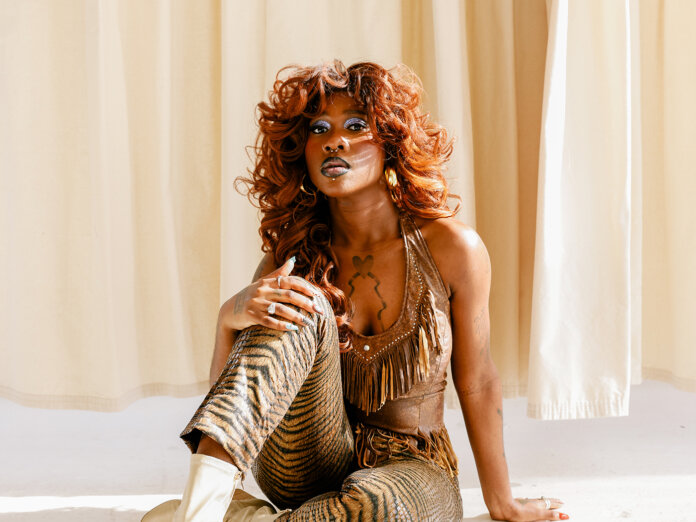Kara Jackson doesn’t do smalltalk. The question at the heart of her debut album Why Does The Earth Give Us People To Love? is one she has been demanding answers to on public stages since her teens, in verses spoken and sung. “It’s an open-ended question, one that plays into so many aspects of my life and can be asked in so many different ways,” she explains. “It’s about grief, and the frustration of dealing with other people, but it can also be in appreciation for the phenomenon of humanity, and how lucky we are to be among the people we get to meet.”
Born in Oak Park, Illinois, Jackson came to public prominence in 2019 as America’s third National Youth Poet Laureate. But it was with music that she first learned to express herself. Raised by “music lovers and music connoisseurs”, she began piano lessons at the age of five and later taught herself to play guitar – all while immersed in her parents’ Jim Croce, Joni Mitchell and Sarah Vaughan records, and with the sounds of Three 6 Mafia and Wu-Tang Clan coming from her older brother’s bedroom.
If that eclecticism was not immediately present in Jackson’s music – debut EP A Song For Every Chamber of the Heart, self-released in 2019, was a set of four straightforward ruminations on love and desire – this year’s album is a fully-fledged realisation of her vision. The songs that would become Why Does The Earth Give Us People To Love? began in a similarly sparse fashion to the EP, recorded in demo form in Jackson’s childhood bedroom in the early days of the Covid-19 pandemic. This time, though, Jackson shared them with her close friends and fellow Chicago innovators Kaina, Sen Morimoto and Nnamdï, who encouraged her to lean into her more experimental ideas.
“I was so excited, I had all these songs, and I think I was just expecting them to come out immediately,” she recalls. “But it ultimately ended up taking a couple of years of listening intuitively to the songs, sitting with them, trying out different ideas as needed and taking out the ones we didn’t like.” The resulting compositions eschew traditional song structures, stretching and twisting in ways seemingly created to best serve the lyrics. Sometimes, as on album opener “Recognize”, that’s a scathing takedown of celebrity and infamy built around four tremulous piano notes; sometimes, as on “Rat”, it’s meandering myth-making in the style of Dylan’s “Desolation Row”, the addition of strings and choral passages splitting the journey into something akin to musical movements.
Jackson remembers being “scared” to experiment at first, having been “so used to hearing just me and my guitar” – but she quickly grew to enjoy the process. The recorded version of “Rat”, which features a field recording of Morimoto revving his car engine, has become a particular favourite: “I was so impressed by how creative you can get with the weirdest sounds”.
The words, of course, came easily: lush lines about love and grief that linger long in the memory. “I love Joanna Newsom’s really long songs, and those old folk songs from the 1700s that are just an extended narrative,” she says. “I think that’s what’s always attracted me to folk music. I grew up around women, gossiping and telling stories, and my dad is from the south, that storytelling tradition.”
It’s an approach that Jackson hopes will continue to serve her well. “The wheels have been turning for sure,” she says of her next project. “I have the skeleton of some songs, some melodies that have been churning in my head for a while, but I’m taking my time.”



